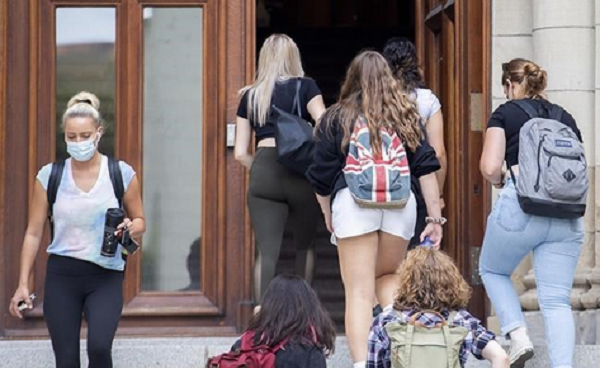Asylum claims filed by international students in Canada so far close to 14,000 in 2024
International students filed almost 14,000 asylum claims while in Canada over the first nine months of this year, a record reached even as the number of new study permits issued to students fell significantly.
Immigration Minister Marc Miller said the increase in asylum claims from people in the country on study permits appears to include false ones filed by students who have been counselled to do so by outside consultants. He cited anecdotal evidence from department officials and the lack of change in conditions in source countries.
The number of people entering the country on student visas has skyrocketed in recent years, as has the frequency of those people applying for refugee status. Those trends have in part driven a wider debate about the number of temporary residents in Canada and their impact on housing and services such as health care.
Some observers had warned that an increase in students claiming asylum would be a consequence of tightened rules for permanent residency as they sought another avenue to stay.
There were 13,660 asylum claims filed between Jan. 1 and Sept. 30 this year by international students attending universities and colleges across the country, according to federal immigration data obtained by The Globe and Mail. There were almost 12,000 asylum claims from international students in all of 2023, the data show, compared with 1,810 in 2018. This year’s total is expected to grow, with three months yet to be counted.
At the same time, the number of international students issued permits fell in the first nine months of this year by more than 100,000, when compared with the same time period in 2023. The change means fewer new international students are being approved to come to Canada than in the past, although the extensions to permits have increased slightly.
The schools with the highest numbers of students claiming asylum so far in 2024 are also institutions that have already been identified as having large proportions of international students. They include Conestoga College in Kitchener, Ont., where 520 claims students applied for asylum from January to September; Seneca College of Applied Arts and Technology, with 490 claims this year; and Niagara College Canada with 410 claims.
Mr. Miller said in an interview that the increase in asylum claims by international students, sometimes within their first year of study, suggests they are being made “mostly falsely.”
“It is quite obvious someone that’s here, that’s been here a year or even more, claiming asylum where no conditions have changed in their home country – it doesn’t smell good, it doesn’t look good,” Mr. Miller said.

“Clearly there is advice being given for people that are here that would otherwise have to go home to claim asylum, and that is not the intention of the asylum system as we have it in Canada.”
The countries with the most claims filed by students on permits and extensions this year are India, Nigeria, Ghana, Guinea and the Democratic Republic of Congo, according to data from Immigration, Refugees and Citizenship Canada (IRCC).
Mr. Miller has written to the College of Immigration and Citizenship Consultants, asking its president, John Murray, to investigate the possibility that licensed immigration consultants are “illegitimately advising international students to claim asylum.”
Mr. Miller’s office told The Globe and Mail reports about false claims have been relayed to department officials.
In January, the minister imposed a two-year cap on international study-permit applications to curb the rapid growth in foreign students entering Canada. Since September, students who attend a private career college in a curriculum licensing arrangement with a public college have been ineligible for a work permit after graduation.
Mr. Murray said the college’s code of professional conduct clearly states that licensees must not encourage clients to be dishonest or to commit fraud, and licensees who breach the code could face criminal sanctions in some cases. The college can impose disciplinary measures including permanent licence revocation and fines.
“The college works closely with IRCC and other partners to protect the integrity of Canada’s immigration system and will collaborate with IRCC to address the specific concerns raised by the minister,” he said in a statement.
But advocates for refugees accused the federal government of scapegoating students and said there isn’t solid proof these claims are fraudulent.
Tanja Maleska, co-executive director of the Canadian Council of Refugees, which advocates for refugee and immigrant rights, said the federal Liberal government has sent conflicting messages to international students over the years. Now, she says, Mr. Miller has “vilified” them.
“We’re very concerned with the rhetoric around the language on international students. It is a very egregious bait and switch that we have done,” Ms. Maleska said in an interview.
Yvonne Su, director of the Centre for Refugee Studies at York University, said she is also concerned by how the minister has discussed the issue.
Prof. Su said students are often under significant pressure because their parents have borrowed tens of thousands of dollars to fund their studies in Canada, and now federal policy changes have made it more difficult to attain the dream of permanent residency.
“There is money to be made off a desperate group of students,” Prof. Su said.
Sean Coote, Niagara College’s vice-president of international, said the school has never been formally contacted by IRCC about any connection to people seeking asylum.
Lenore Parsley, a spokeswoman for Cape Breton University, which had 370 students claim asylum from January to September, said it’s important to recognize that the number of asylum seekers is a small segment of the total international student population. She said CBU is committed to supporting all students, “including those facing crises related to political or social instability in their home countries.”

Conestoga College said it was not aware of any students asking for asylum.
Marie-Karlynn Laflamme, a spokeswoman for the University of Quebec at Chicoutimi, which had 345 asylum claims in the first nine months of the year, said the university is surprised by the number of students claiming asylum, but it can’t know ahead of time who will do so.
Tom Kmiec, the Conservative immigration critic, blamed the federal government’s own policies for the rise in claims. He said it is an “abdication of leadership” by Mr. Miller to blame immigration consultants after the government previously approved massive numbers of student visas.
This article was first reported by The Globe and Mail












